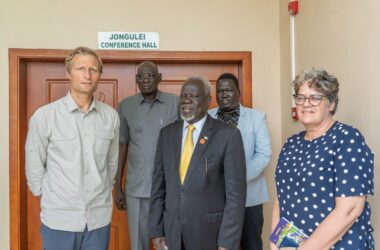By Alan Clement
The recent declaration by the Bank of South Sudan (BoSS) recognizing mobile money as legal tender has triggered a debate with traders, buyers and economists, expressing varied views on its feasibility and timing.
While some traders and buyers cautiously accept this directive, economists have raised concerns over its timing, practicality and potential consequences.
The new directive requires all sellers, service providers, and institutions to accept mobile money as a mode of payment, with penalties for non-compliance. The central bank’s move is aimed at modernizing financial transactions and reducing overreliance on physical cash in a market hampered by persistent liquidity shortages.
A prominent businesswoman in Munuki market, Edith Poni, who owns both retail and wholesale businesses, acknowledged the policy as a step in the right direction. She noted that digital payments may curb theft, especially from street criminals and motorbike gangs, as electronic money can be recovered even if a phone is stolen.
However, she warned that persistent network failures and high costs of mobile money withdrawals, especially in large wholesale transactions may pose as serious obstacle for the practical implementation of this initiative.
According to her, some loyal buyers are willing to incur the extra charges, but most of them expect traders to carry the costs, describing it as unsustainable for businesses that deal in large transactions.
“I urge the central bank to explore mechanisms that would allow wholesale traders to conduct large-scale mobile money transactions, including international transfers, without facing exorbitant charges,” she said while suggesting the expansion of the mobile money system to accommodate dollar transactions to support international trade. She added that other wholesale traders she works with share her concern as they frequently consult each other on such policy matters.
Among buyers thou, this directive received a more favorable reception. Elisa Giryang, a resident of Gudelle 2, praised the initiative as timely and convenient emphasizing that with growing exposure to digital technology in cities, buyers are likely to adapt with relative ease. “Mobile Money payments will potentially reduce market-related theft due to reduced cash handling,” he said.
However, Elisa expressed doubt about the policy’s effectiveness in rural areas, where according to him, “many traders and consumers lack the digital literacy and infrastructure required to transition from cash to mobile payments.”
Some economists have however criticized the move, arguing that it is premature and out of touch with South Sudan’s current economic structure. Economist Abraham Maliet was particularly critical of the policy which he described as ill-timed and largely symbolic.
He argued that over 90 percent of the country’s economy remains outside the formal banking system and is heavily cash-based. Maliet raised concerns over the lack of strong cybersecurity systems and data protection laws in South Sudan, warning that use of mobile money could expose users to fraud and manipulation in a fragile financial environment.
“This announcement could undermine public trust in the banking system by openly admitting to a shortage of cash in circulation,” he said.
Maliet, advised the central bank to suspend the implementation of this directive and instead conduct a pilot program to its feasibility emphasizing that adapting it should be driven by market necessity rather than government mandate.
The economist recommended the central bank to focus on increasing domestic production, which he said would help expand the economy and improve liquidity as an alternative to digitalization. He proposed the introduction of higher denomination banknotes such as SSP 10,000 and SSP 50,000 just like neighboring countries like Uganda to ease the pressure on cash circulation.
He called on the central bank to bring in more cash into the formal banking system by encouraging deposit habits through commercial banks. “The nation can achieve this by offering attractive financial products and ensuring that customers can access at least 50% of their deposits when needed through commercial banks,” Maliet said in an exclusive interview with this outlet.
Maliet further advised commercial banks to be brought in to structured conversations on how to regulate and legalize loans and interest rates in a way that supports economic growth by the central bank.
While mobile money holds potential as a safer and more efficient payment method, especially in urban areas, the responses from different sectors show that the country is not yet fully prepared for such a sweeping change. Without adequate infrastructure, awareness, and security systems, the central bank’s policy may struggle to achieve its intended impact and could, instead, create new challenges in an already fragile economy.



